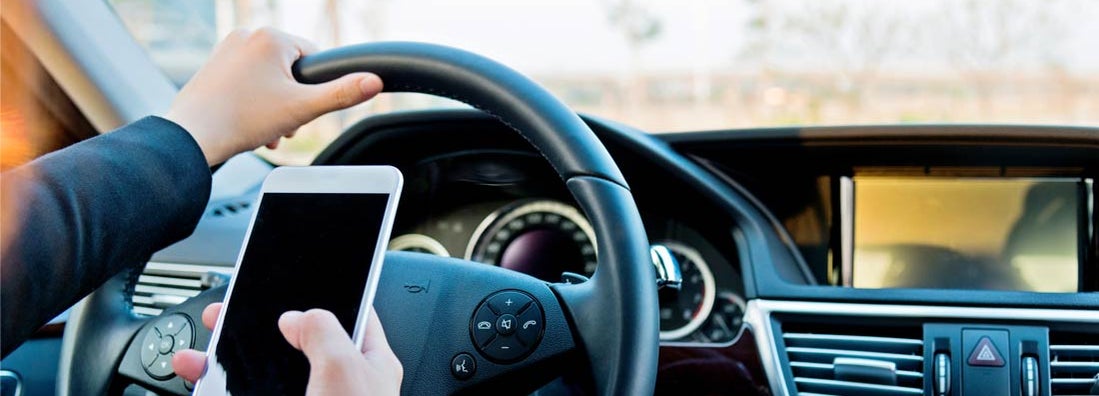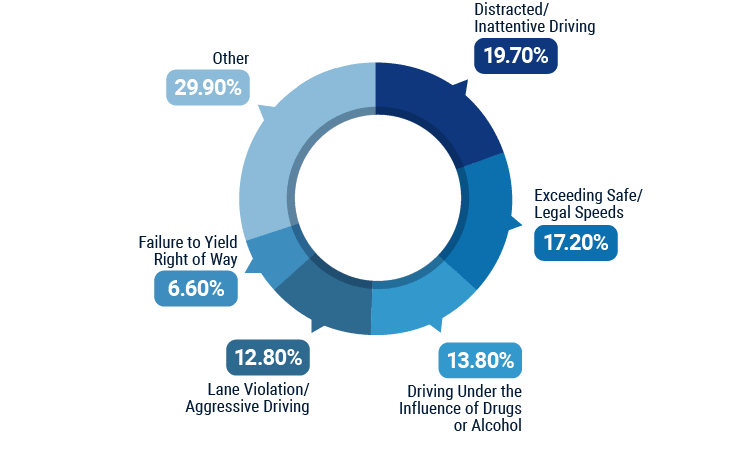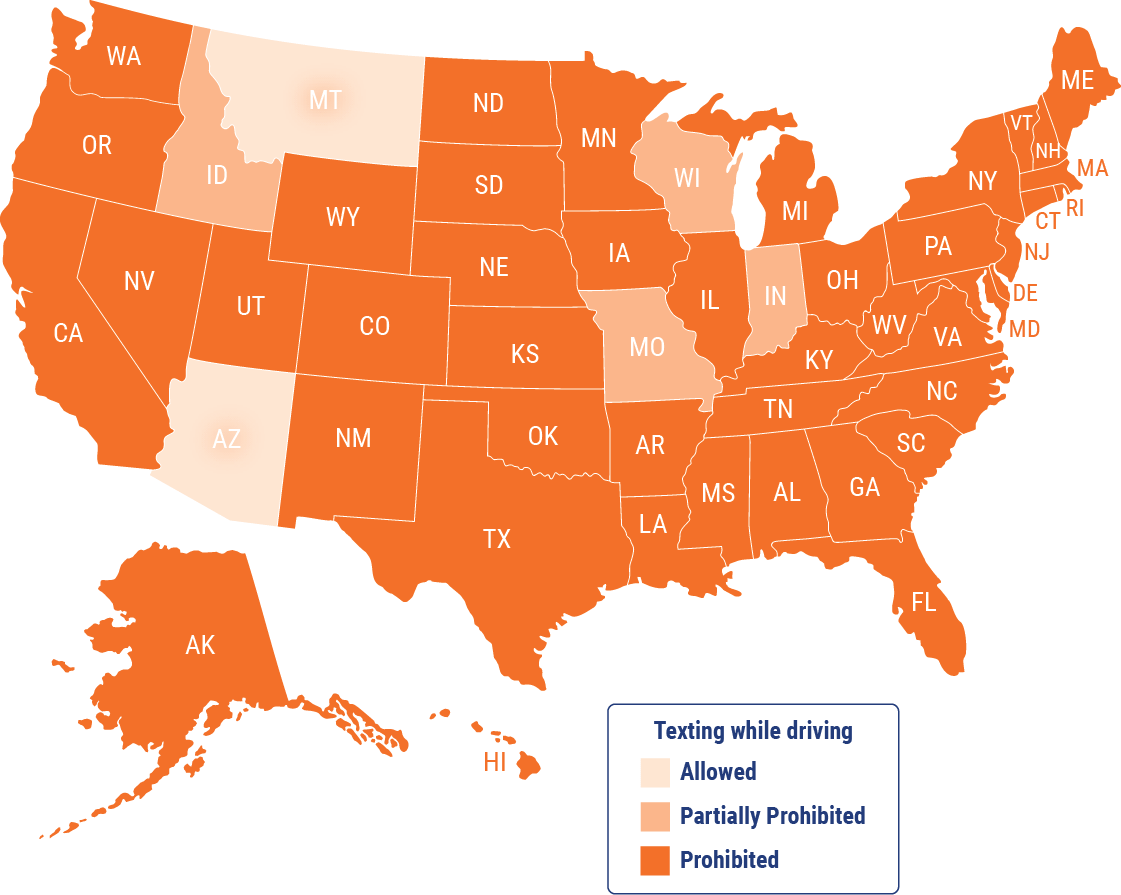Colorado Distracted Driving
(It's more than just not texting.)

There are roughly 120,000 car accidents every year in Colorado. And most of these are simple distracted driving mistakes that are completely preventable.
That’s why arguably THE most important thing you can do behind the wheel is keep your hands at 10 and 2 and your eyes on the road. Always.
What Is Distracted Driving?
The Colorado Department of Transportation defines distracted driving as “The act of driving while engaged in anything—texting, looking after children, talking on the phone or to a passenger, watching videos, eating, or reading—that takes a driver’s focus away from the road.”
Currently, in Colorado, lawmakers are focused mainly on preventing distracted driving accidents that are caused by texting while driving and cell phone use by younger drivers. But there's a lot more to distracted driving than just text messages and emojis.
Distracted Driving Statistics in Colorado
You don’t have to follow the local news every night to know that distracted driving is a problem, but here are a few statistics that might help you understand just how serious it is in Colorado:
- In 2018, 15,673 car accidents in Colorado were due to distracted driving. That’s an average of 43 crashes a day!
- In a 2018 survey conducted by the state, 91% of Colorado drivers reported that they had driven while distracted in the past seven days.
- In that same survey, 33% of respondents admitted they had sent a text message while driving within the previous week.
Leading Causes of Driver-Error Accidents in Colorado

Distracted driving is Colorado's leading cause of driver error accidents. In fact, crashes caused by driving while distracted are almost twice as common as driving while intoxicated.
Does Colorado Have Laws against Distracted Driving?
Yes.
Though Colorado still allows drivers to talk on handheld cell phones, a bill that would have required hands-free driving passed through the state Senate but failed to gain approval from the House in April 2019. Though the bill died, the fight to put an end to handheld cell phone use by drivers continues.
The current distracted driving law in Colorado states:
- Text messaging while driving is prohibited.
- Drivers under 18 are prohibited from any cell phone use, including hands-free.
- Drivers of all ages who currently hold a learner’s permit are prohibited from using any mobile communication device.
Are There Any Exceptions to the Distracted Driving Laws in Colorado?
The Colorado distracted driving law has only one exception: Drivers of all ages are permitted to use a wireless device for phone calls or for sending or receiving text messages to contact a public safety entity, or during any of the following types of emergencies:
- If the drivers have reason to fear for their life or safetyI
- If the drivers believe that a criminal act may be perpetrated against them or another person
- If the drivers are reporting a fire, serious traffic accident, serious road hazard, or a medical emergency
- If the drivers are reporting a person who is driving in a reckless, careless, or unsafe manner
Colorado Distracted Driving Laws at a Glance
| Yes | No | |
| Is texting while driving legal? | X | |
| Can you send/receive texts at red light? | X | |
| Is handheld device use permitted? | X | |
| Any special restriction for young drivers? | X | |
| Is headphone/headset use permitted? | X * |
* headphones, earbuds and headsets permitted when used in one ear only
Is It Legal to Eat a Cheeseburger while Driving in Colorado?
Yes. But that doesn't really mean you should.
Distracted driving comes in many forms, and eating a cheeseburger can be just as distracting as talking on a handheld cell phone. Basically, anything that takes your attention away from the primary task of driving is a hazard not worth the risk. Ever.
So, what happens if a police officer in Colorado spots you eating a cheeseburger while driving down the street? In most cases, nothing. There is no law that specifically states that you cannot eat while driving in this state.
However, even legal distractions (like eating or adjusting the radio) can significantly increase your risk of being in an accident or driving erratically. This might get you cited for a moving violation or reckless driving, so it's better to avoid as many distractions as possible.
Unless you are really in a hurry, you’d probably be better off eating your lunch indoors or in the parking lot.
What Is the Difference between Primary and Secondary Enforcement of Distracted Driving Laws?
Primary enforcement of distracted driving laws means that the police can pull you over if they see you violating state distracted driving laws.
Secondary enforcement of distracted driving laws means that police can cite you for violating distracted driving laws only if you break another law while doing so.
Colorado uses secondary enforcement.
This means that even if a police officer sees you texting while driving ,as long as you are in total control of your vehicle at the time, you can't be pulled over for violation of the state’s distracted driving laws.
Colorado law stipulates that law enforcement officers can only cite you for texting if you are driving in a “careless or imprudent manner.”
What Is the Penalty for Distracted Driving in Colorado?
In Colorado, a violation of the distracted driving law is penalized as follows:
- For drivers under the age of 18, a violation is considered a Class A Traffic Infraction.
- The first offense is fined $50 plus 1 point is added against your driving record.
- Subsequent offenses are fined $100 and 1 point is added against your driving record.
- For drivers 18 and older, a violation is considered a Class 2 Misdemeanor Traffic Offense.
- A first offense is fined $300 and 4 points are issued against your driving record.
- Subsequent offenses are fined $300 to $1000 and can include up to 1 year in prison. Additionally, 4 points are issued against your driving record.
Colorado compared to the rest of the US on texting and driving restrictions

Currently, every state in the US has a law that prohibits some sort of cell phone usage except Montana and Arizona. But once 2021 rolls around and Arizona's law comes into effect, Montana will be the only state left.
Does Distracted Driving in Colorado Increase Insurance Rates?
For drivers under the age of 18, a distracted driving violation adds a point to their driving record, which makes it likely their car insurance rates will increase.
And because this law uses secondary enforcement, it's likely that the teen driver has violated another law and that citation can also contribute to a rate increase.
For drivers 18 and older, the four points added to the license, plus the primary violation that got them pulled over in the first place, is highly likely to cause a significant increase in their car insurance rates.
Also, drivers who were enjoying a safe driver discount will have it revoked, raising those premiums even more.
What If I Drive into Wyoming or Kansas?
Distracted driving laws vary by state, so you may be wondering what happens if you drive into a neighboring state that has different laws.
One of the biggest differences between distracted driving laws in Colorado and those of a number of other states is in how laws are enforced. Colorado is one of the few states that has secondary enforcement for texting and driving.
So, if you are used to texting while “driving safely” and you drive into a state with primary enforcement, things can go bad quickly.
Any time you drive off into another state, you're subject to their laws. So if you're reading a text while driving through Wyoming, Kansas, or a number of other nearby states, you can get pulled over and fined – even if you are in total control of your car.
Claiming ignorance of the law will not get you out of a ticket, so be sure to review the distracted driving laws of other states before you take your next road trip.
What Is Colorado Doing to Prevent Distracted Driving?
Despite evidence that it adds to the distraction of a phone call, Colorado still allows the use of handheld devices while driving. State lawmakers like Senator Lois Court continue to work toward strengthening distracted driving laws in this state.
In the meantime, Colorado’s harsh penalties for a violation will have to do as far as a deterrent goes.
Also, Colorado’s “Get Turned On” campaign hopes to limit distracted driving in this state by encouraging drivers to turn on a “do not disturb” app on their phones while they are driving.
That way, those who text or call them will receive a message that the person they are calling is currently driving and will get back to them later.
So What Can You Do?
Quite simply, just put the phone away — even if that means in the glove compartment. The fines themselves are definitely not worth it, let alone the more serious consequences to you and others on the road. Let’s all just get where we’re going safely and save the texting until you get home.
https://www.codot.gov/safety/distracteddriving
https://leg.colorado.gov/content/distracted-driving-and-cell-phone-use
https://www.colorado.gov/pacific/csp/crash-trends
https://www.codot.gov/library/traffic/safety-crash-data/crash-data/crashes-by-county-2000-2015/view
https://www.codot.gov/library/traffic/safety-crash-data/crash-data/distracted-drivers-in-crashes
